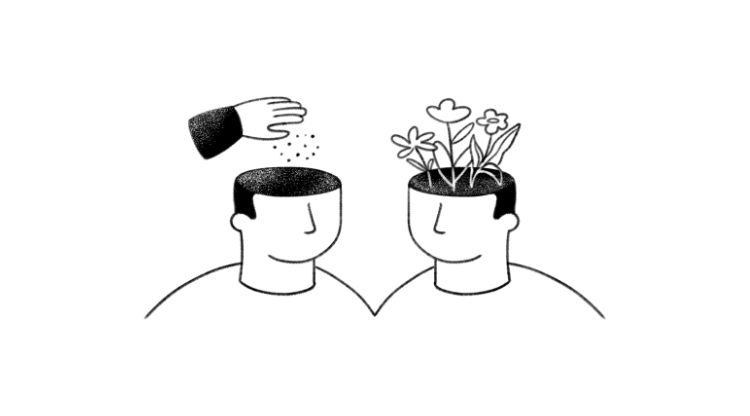individual self-management support
choose individual support to achieve your self-management goals

“I think this support was the best thing that ever happened to me. I learned so much about myself and my life goals that I made much faster progress than I thought I would. It’s a really worthwhile investment of time and money. And I’d like to thank the mental health worker who supported me throughout the process and gave me the opportunity to go at my own pace. I learned that anxiety is a normal part of life. Thank you!”
- Josée Ferland, participant

self-management at the heart of individual support
You will be supported by a Relief mental health worker throughout your journey.
You will (re)discover a better quality of life, and learn to take better care of yourself and your mental health, with the help of active listening and self-management tools.
This is not psychotherapy, and is in no way intended to replace it.
Rather, psychotherapy is seen as a complementary approach to this self-management support.
The individual support will help you identify strategies to (re)establish in your daily life, to gain control over your mental health.
the support includes:
![]()
16 topics
![]()
psycho-educational content:
exercises, discussions
and readings
![]()
individual sessions with a mental health worker

![]()

pick the format that suits you best: in person at Relief or virtually via Zoom

![]()
rapid access: after registering, get an appointment without delay

session content: 50 minutes with a mental health worker and a 20-minute follow-up session
![]()
6 reasons to choose this support format
we offer you much more than individualized support.
1. Tailored: throughout the support, you will remain the key player in making the decisions that concern you;
2. Adapted to your needs: you can choose your desired number of sessions and the topics according to your interests and goals;
3. Flexible: you can choose from the outset whether you want the sessions to be held in person or virtually;
4. Personalized: you will be supported by the same mental health worker throughout;
5. Innovative: you will have one-year access to a personalized, secure digital platform where you can access your tools and the psycho-educational content of your chosen topics at any time;
6. Created for you by people like you: This program was co-created by a research team made up of people like you who live with anxiety, depression or bipolar disorder, as well as mental health researchers and professionals.

explore the 16 topics
according to what you are experiencing
welcoming and accepting experiences
Acceptance is defined as consenting to experience psychological events (thoughts, feelings, sensations and memories) without avoiding them or allowing them to exert undue influence over our behaviour. It is therefore the opposite of avoidance.
Acceptance does not mean that you want to experience unpleasant sensations. When you welcome them, you don’t fight the manifestations; you let them be so that they don’t control you.
behavioural activation
Behavioural activation is a therapeutic approach that focuses on taking action to promote the pleasurable experiences associated with actively participating in activities and decreasing behaviours that maintain negative affects.
In other words, behavioural activation aims to counteract passive avoidance of unpleasant situations by proactively engaging in activities that make you feel good, regardless of your mood or motivation level in the moment.
comforting activities and anchoring
Sometimes, our hectic lives and many responsibilities overwhelm us, and without even realizing it, we start spending less time on activities that make us feel good. In other cases, living with symptoms of anxiety or depression can cause us to lose interest or to feel very distant from activities that used to help our well-being.
However, engaging in activities primarily aimed at self-care can positively affect us, and should not be neglected. You may need support to take stock of these comforting activities and help you implement them on a daily basis!
assertiveness and communication
Assertiveness can be described as an external manifestation of your self-esteem. Being adequately assertive means being able to express your needs, ideas and values without resorting to aggression or submission.
Healthy assertiveness is being able to express yourself and defend your rights without encroaching on those of others. It is an attitude of healthy firmness in relation to people and events.
self-compassion
According to Kristin Neff, the researcher who pioneered this concept, self-compassion is an attitude of being kind and understanding toward ourselves in difficult times. It is not synonymous with complacency or self-pity, but an active posture associated with emotional well-being. Self-compassion allows you to soften your language toward yourself.
Mental filters that influence our thinking
Each of us has filters, also known as cognitive distortions. These are automatic thoughts that come to you when you have symptoms of anxiety or depression, and skew your perception of reality. It has been shown that the way we understand and interpret situations influences how we feel and react. Hence the importance of being aware of the presence of your filters so as to be able to nuance or influence their impact on you (emotions, moods, actions and reactions) and on others.
stress management
Stress management is one of the tools you need in order to maintain balance in your daily life. In this topic, you’ll explore tools that will help you learn to better cope with stress on a daily basis.
lifestyle habits
Healthy lifestyle habits help to maintain mental well-being and contribute to a healthy life balance. In this topic, you will explore diet, sleep, physical exercise, and alcohol and drug use. This is an area over which you can have a great deal of power to act... although this is often easier said than done, especially at first.
Changing your lifestyle habits won’t produce miracles, but a healthy lifestyle will predispose you to better managing your anxiety or depression symptoms. This can be difficult in the beginning, given the repeated effort it requires on your part and the difficulty of shedding familiar and sometimes entrenched ways of doing things.
anxiety and mood diary and introduction to warning signs
This topic helps you assess fluctuations in your mood and anxiety on a daily basis. It covers concrete tools to help you better understand yourself and identify warning signs and avoid relapse.
functional cycle you may encounter at work
This topic will explore functional cycles at work as well as potential solutions and strategies that you can apply to manage the impact of your mental health on your work or vice versa.
your support network and breaking out of isolation
This topic will help you identify the people around you who provide you with professional or personal support. Family members are often the first people that spring to mind, but don’t forget your friends, colleagues, people from the community, neighbours, etc. who can all strengthen your network.
mindfulness and relaxation
While mindfulness is based on Buddhist teachings, it is neither religious nor esoteric. Practising mindfulness is a unique way to experience the present moment—deliberately and without value judgments.
Anyone can work brief mindfulness and relaxation exercises into their daily lives. This topic is an occasion to discover or deepen your experience of mindfulness and relaxation.
emotion regulation
This topic is an invitation to identify the emotions that make up your inner landscape. You’ll be able to recognize the strategies you already use to take care of your emotions, observe them, and become aware of their functioning in your daily life. You will also learn new strategies to regulate certain emotions more effectively.
problem-solving
Everyday problem-solving can be a source of worry and anxiety. The problem-solving strategy we will look at will help you focus on your issues and resolve them more effectively, even when you feel less able to find solutions. The method involves breaking the process down into small steps and should help you work toward an appropriate solution more effectively by taking a step back to focus on the problem at hand and structure your thought process.
types of support and relationships with loved ones
Relationships with others are part of what defines us as individuals. In a way, relationships reflect a part of what we are, and the choices we make. Our self-esteem evolves through relationships with others; our ups and downs are partly shaped by others. This topic will help you identify the different types of support and recognize how each person in your network can help you.
personal values, choices and priorities
It’s not always easy to identify the values that guide our actions, choices and priorities. This topic will help get you thinking and enable you to analyze your needs according to your tastes, preferences and interests before making your decisions.
my self-management review
Individual self-management support culminates in a review session. This is a time to celebrate and take pride in everything you’ve achieved during your journey. It is also a time of reflection where you can observe and assess how far you’ve come and look ahead to support your next steps.
Do you have any questions? Contact our team, and we will walk you through the steps.
detailed overview of the support program

first session
my current self-management portrait
$95
This 50-minute session will help determine your individual self-management support path together with your assigned mental health worker.
![]()
topic-focused session
$95
/ session
Price includes:
- One 50-minute session
- Access to the digital platform for one year
- One 20-minute follow-up session by phone or Zoom
![]()
final session
my self-management review
$95
This 50-minute session is intended to highlight your achievements and set a new goal to support your next steps.
here is an example to help you understand the costs of this service:

Louise lives with anxiety and wants to start her journey toward getting better.
Before the first session: Relief send an email to Louise to set a time for topic-focused sessions and follow-up calls as part of her individual support.
First session - My current self-management portrait (50 minutes): With the mental health worker’s help, Louise completes her first session. She identifies her goals and settles on 8 topics. Two weeks later, she will begin her journey. ($95)
During the week following her meeting, Louise can ask her counsellor any questions she may have during the 20-minute follow-up call.
2nd session (50 minutes): Louise is ready to begin receiving individual support in line with her personal goals. She discusses the first topic she has chosen, “Welcoming and accepting.” ($95)
During the week following her topic-focused session, she puts into practice the strategies she identified with her mental health worker, and is able to go over her reflections during the 20-minute follow-up call.
3rd to 9th sessions (50 minutes each): Louise continues to explore her chosen topics, with a follow-up call between each topic-focused session. ($95/topic-focused session)
Final session (50 minutes) - My self-management review: Louise is nearing the end of her journey. She looks over her achievements, plans for the future and celebrates and takes pride! ($95)
Louise invested a total of $950 for her entire journey, which covered 8 topics. She paid for these topics before each session. Her journey will have lasted 20 weeks.
eligibility criteria
To register and begin receiving individual support, you must:
- be over 18 years of age;
- communicate proficiently in French or in English;
- be able to use technological tools;
- live with anxiety, depression and/or bipolarity (whether you have a diagnosis or not);
- have a desire to engage in a personalized self-management journey;
- be prepared to commit to an ongoing process involving sessions (every other week) throughout.
payment and cancellation policy
Each session must be paid before the 20-minute follow-up call, every two weeks.
If payment is not received, the session will be cancelled.
There is no charge for cancelling an appointment at least 48 hours before the scheduled time.
Regardless of the reason, if an appointment is cancelled with less than 48 hours’ notice, a $95 administration fee will apply.
« I've witnessed such inspiring self-management journeys! It's impressive to see the daily changes in the mental and even physical health of a person who becomes aware of the power of a small conscious action, once a day. »
- Christine Sauvé, mental health worker

faq
what is self-management?
Self-management refers to taking action to regain control over our mental health through daily behaviours that diminish symptoms, help prevent relapses and improve well-being.
A self-management approach does not replace conventional treatment, but can be a very effective complement to psychotherapy and pharmacotherapy.
Find out more about the benefits of self-management.
can I do a topic on several sessions?
No, individual self-management support is based on one topic per session. It is, therefore, not possible to spend several sessions on a single topic.
how much do the sessions cost?
Each session costs $95 and must be paid before the follow-up meeting.
what are the payment terms?
Each session costs $95 and is payable in one lump sum.
To register for the support and for the first My current self-management portrait session, please complete this form.
Thereafter, subsequent topic-focused sessions are payable using this form. Each of these sessions must be paid before the 20-minute follow-up session, every two weeks.
are the sessions reimbursable by insurers?
Yes, some insurers now agree to reimburse Relief's individual self-management support meetings.
To find out, you'll need to check with your insurer to see whether it agrees to reimburse this service and whether your policy covers it. Before registering, you can submit the supporting letter, which includes a specimen receipt.
when Relief issues a receipt for reimbursement?
Two hours after your meeting, you will receive a PDF receipt by e-mail that you can submit to your insurer for reimbursement or to apply to your tax return.
can I cancel a session and come back the following week?
If a session is cancelled, it cannot be rescheduled. You will need to wait for the next scheduled session. We encourage you to read our payment and cancellation policy.
how can I cancel and request a refund for a session?
There is no charge for cancelling an appointment at least 48 hours before the scheduled time. Regardless of the reason, if an appointment is cancelled with less than 48 hours’ notice, a $95 administration fee will apply.
do I have to decide on all my topics during my first session?
No, you don’t have to choose all your topics from the beginning. It is advisable to have an idea of your goals, but you can change them as you go along. Flexibility is a key part of our approach and our support service.
do I have to do the exercises on the platform?
No. However, we strongly recommend that you get actively involved in order to get the most out of the support.
why do I need to be comfortable with technology if I choose in-person sessions?
The psycho-educational content on self-management support is available on a digital platform, so being comfortable with technology is a requirement for people who choose in-person or virtual support. It is recommended to read and answer questions before and during the sessions, to make the most of them.
am I the only person with access to my answers on the digital platform?
Yes, access to your account on the platform is secure and reserved for you. You will be able to log in with a username and password.
can I continue to see my psychologist while I’m receiving individual support?
Of course! You are encouraged to pursue any other approach with a professional during your individual support journey. This is a complementary process that aims to give you concrete tools to use on a daily basis.
what is the background of the mental health worker(s) who will work with me?
At a minimum, the members of Relief’s intervention team hold an undergraduate or graduate university degree in a field related to helping relationships (psychology, social work, psycho-education, or other suitable university training) or accredited training in peer intervention offered by Université Laval and in collaboration with the Pairs aidants réseau program of the Association québécoise pour la réadaptation psychosociale. In addition, our team members have extensive experience with mental health issues, as well as individual and group support.
is it possible to interrupt the support and resume later?
We ask that you commit to an ongoing process of sessions (every two weeks) throughout the support, which is why the process cannot be interrupted and resumed later.
is this support also available for loved ones of people living with anxiety, depression or bipolarity?
This service is not intended specifically for loved ones. However, loved ones and family members also have their own mental health to look after, and they may also need to address their own issues related to symptoms of anxiety, depression or bipolarity. One-to-one sessions are a good time to open up in a safe setting and find the tools to take care of yourself, so that you can return to your loved one better equipped.
can I sign up for another Relief service and also receive individual self-management support at the same time?
Absolutely. You can participate in a self-management workshop and a support group. Several of the topics are also complementary to our workshops.
do you have another question?
If you need any help understanding or registering,
contact our team and we'll go through the steps with you.

by email
accompagnement@relief.ca
Monday to Friday,
9 a.m. to 5 p.m.
Write to

